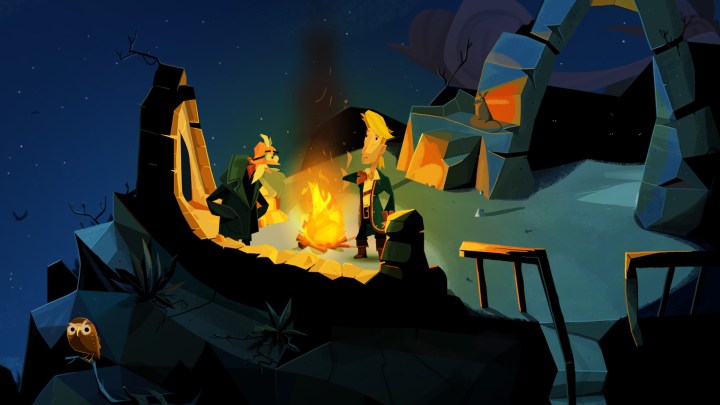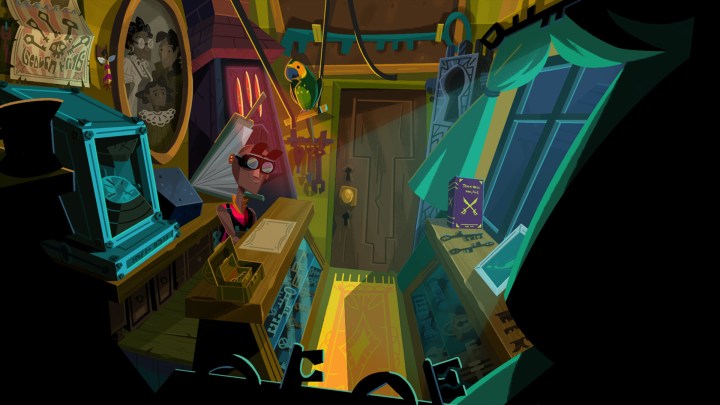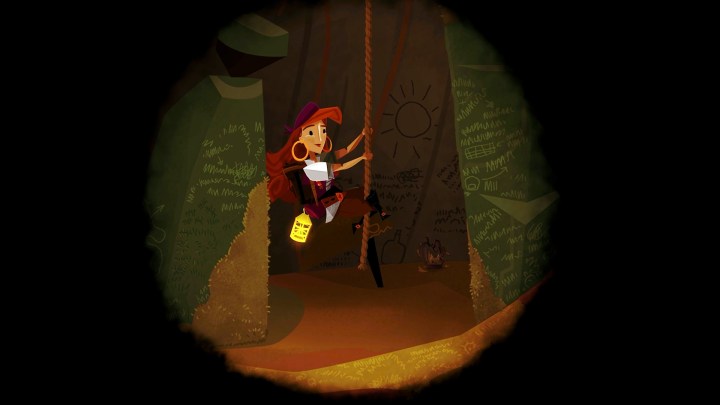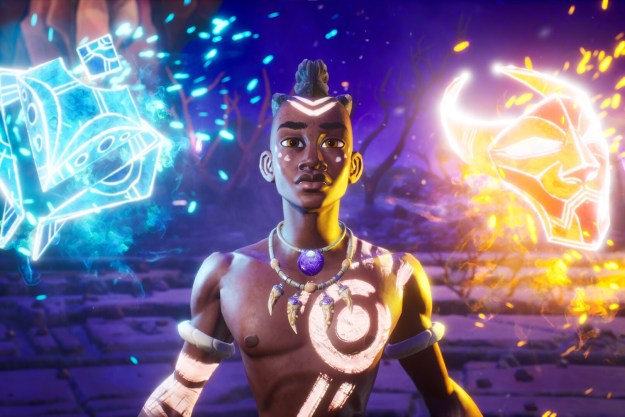Few adventure games series have the staying power of Monkey Island. Something about the humor and heart in the ongoing travels of Guybrush Threepwood as he strives to become a mighty pirate has resonated with players ever since the point-and-click adventure game The Secret of Monkey Island first released over 30 ago.
Following the 1991 release of Monkey Island 2: LeChuck’s Revenge, there have been sequels and homages, but none made by the original creators of the series. That’s changing with the upcoming release of Return to Monkey Island, which launches on September 19. I had a chance to sit down with series creators Ron Gilbert and Dave Grossman at PAX West to ask them about what brought them back and where the newly revived series goes from here. For them, the sequel is a matter of unfinished business — both for Guybrush and themselves.
Why are you returning to Monkey Island after all these years?
Ron Gilbert: This story really is about unfinished business. And I think there’s two levels. There’s the unfinished business Guybrush has with finding “what is the secret of Monkey Island?” And then I think there’s the unfinished business that Dave and I have of doing a new game, and it is about this unfinished business.

Dave Grossman: We sort of left a thread dangling in midair about 30 years ago.
There have been other Monkey Island titles that have danced around, but not strictly continued the story. Can you share where and when this story takes place?
Gilbert: It starts right at the end of Monkey Island 2. And then it gets really bizarre. And that’s all [we will] share. Because I really want people to experience that moment.
This is a series that has been around for over 30 years. How do you approach building an adventure game in 2022?
Gilbert: I think a lot of the same ways we approached it back then. I think there’s a fundamental thing to how you do an adventure game and how you tell the story. And especially the story in adventure games, which are primarily kind of pulled along by puzzles, that I think there’s just a way you do that, that just hasn’t really changed that much. So at its core, not much.
But on the other hand, the audience has changed quite a bit. We’re not dealing with eight-year-old boys who have tons of free time. We’re dealing with an audience that now has the choice of hundreds of games to play, and has hint systems at their fingertips in the form of Google. And we’re dealing with people who will, quite frankly, have lives, and they have to think about games a little bit differently than maybe people a long time ago. So that is very different. We need to look at how that audience approaches that adventure.
With that in mind, what has been done to make it so people without infinite time can progress through the game?
Grossman: One thing, there’s a built-in hint system … We don’t want to just sort of say here’s what you do, which is what you find in a walkthrough. We think that’s less fun than just sort of getting a nudge from somebody who knows what the game is about.
We can sort of step up the pace for the audience, we’ve done a little bit to improve the exploration, just in the way that we implemented the UI for that. The way you get through one of these games is largely solving puzzles with tools that you pick up. So you have an inventory full of stuff, and that hasn’t changed. And if they’re some sort of exotic, special-use item, you want to be able to trigger whatever it is that they do.

Those map to the old, “look at thing, pick up thing and use [thing].” And so we’ve made an interface that only presents those options, and only where they make sense. The “use” is particularly problematic, because it’s super fake, right? So we started writing these little text descriptions of what’s actually going to happen. And we gradually realized that these are actually very flavorful. And they represent Guybush. He has thoughts about the world around him. And we thought, this is another great avenue for us to tell the story and expose character. And so we got really into that for a while. And we think it’s a great, just a great addition, that not only streamlines things, but it also kind of makes the game richer.
Did you know going into this game that you wanted to strictly stick to a point-and-click style adventure?
Gilbert: Yeah, I think so. Point-and-click is more than just an interface. Point-click is almost a way to tell a story. It’s a narrative framework that you lay on things with the puzzle-solving, moving things forward. And I think that’s something that Dave and I are very familiar with, and definitely something that we wanted to do with this game. Because there is some nostalgia in that. If this game had just turned into a first-person shooter or, you know, a video playback game or something, it’s not really what this is about. I think that the point-and-click nature is kind of the core of what we want to do here.
Grossman: One thing that impresses me is how smooth the controller interface is actually for doing point-click stuff. It’s just elegant and well-thought-out. It’s just a different approach to drive Guybrush around.
What are the challenges of being funny in a video game? How do you approach putting comedy into a game?
Grossman: I don’t know why people say comedy is hard, and I don’t know why they say it’s hard in games, because it isn’t. It’s a worldview. I think the only way that I am able to deal with a world, which I feel is absurd, is just by making fun of it. I feel like I have just got to make fun of everything [in the game], the same way that I’m thinking about everything around me. And it just makes it funny.

People worry about timing and how you don’t really control the timing in one of these games. But that’s kind of false as well. Because the timing that’s critical for a joke to land is sort of momentary timing that we would put inside of a tiny, noninteractive thing. It’s like how much space is there between Guybrush’s line and the next person’s line. You really can spend some time adjusting that. So maybe if you don’t have a sense of timing, that does make it hard. There is kind of a musical aspect to it — you’ve got to put that line at exactly the right spot. But we do have total control over that kind of time.
And just as a general approach, we sort of work from the top-down and come up with a concept for the game, and then we come up with some chapters for the game, and then we come up with puzzles that go into the chapters and we sort of get finer and finer and finer. And we just try to be funny at every step of that process. And by the time we’re finished, the game is funny.
I just can’t imagine a world where there are no more Monkey Island games.
So in terms of Guybrush Threepwood, has he evolved much from the last time we’ve seen him and experienced his adventures?
Gilbert: He doesn’t. I mean, he’s very kind, very happy-go-lucky. You know? It’s like, the glass is always full for him. Not even half=full. It’s full. And I think this kind of makes him so endearing and charming. He does look at everything with this kind of wide-eyed enthusiasm. And we want players to look at the game through Guybrush’s eyes. So I don’t know that he has really changed. He’s not like a cynical bitter old man in this version of the game. I think there’s a little bit of oldness. I mean, he’s a little more experienced. He’s not the ‘I’m Guybrush I want to be a mighty pirate’. He is a mighty pirate now. So there is experience that goes along with that.

Grossman: Yeah, his attitude is sort of “I can find a way to solve this problem,” and he just doesn’t really think about the consequences that might occur. That’s sort of at the heart of what’s going on.
So when you look back then at the original, is that like looking into your past in terms of where you were mentally and what you were thinking about?
Gilbert: Yeah, it’s like, you can kind of look at those early games as a little metaphor for our stages as designers. The first one is Guybrush as a young pirate who wants to succeed as a pirate, and it was certainly like one of the first games we ever did. We were Guybrush in that sense. In the second game, he had some success. And he’s trying to prove himself now. And again, that’s kind of what we were doing with the second game. So it was a little bit of an autobiography that follows through those different games.
And is the same is true here, then?
Grossman: Totally, yeah. It’s unfinished business for us, unfinished business for Guybrush. There’s definitely a little mesh between real life and the game story.
I think if you try to make everybody happy, you just end up with a product that is boring.
Is there a balance that you look to strike between your image for what you’re creating versus what you think people might be expecting? Or are you really just all-in on your own artistic vision?
Grossman: If we think about what people were actually expecting, we’d be likely to do the opposite because we don’t want to just do what people expect. That’s never interesting. Like, we do think about how things were going to be received by the audience. That makes us cautious about some things, but sometimes we have to just do what is right for the game.

Gilbert: I mean, ultimately, you have to do as you believe in. You know, I think if, fundamentally, you believe in what you’re doing, you’re not just crapping out a game for a paycheck. If you really believe in what you’re doing, I think that does come through. And a lot of people, in their defense a little bit, they haven’t played the game yet. They’ve just seen screenshots or seen little video clips. But it’s something we very deeply believe in. We believe in this game, we believe in the choices that are made for that game.
In some ways, it’s a part of being a creative person in the modern world where everybody has a megaphone, and everybody can just scream at you over little things. Like some guy on Twitter got very upset over the font we were using. The font. And he had this whole Twitter thread. And it’s like, I mean, I’m glad you’re passionate about the game at that point, but again, is that really the sword you’re dying on?
Everybody’s gonna have an opinion, especially when you do a game Like Monkey Island, that’s had 30 years of this nostalgia built up for it. And quite frankly, it’s a different thing for everybody. There is no choice that Dave and I could have made that would have made everybody happy … I think if you try to make everybody happy, you just end up with a product that is boring, which is probably what you would get from a focus-tested game. They’re boring on some level. So do we just do what we believe in.
I like the thing you said about the relationship between artists and social media today. Nobody was ever on the internet saying, “Hey, Monet, your paintings are blurry and you suck!”
Grossman: Ron Gilbert bigger than Monet!
It will be interesting to see what the story is like when we are 68. It will be about going to bed, mostly.
In terms of his story, you’ve been upfront that this is the conclusion, this is where we’re wrapping things up.

Grossman: No.
No? I misread that then.
Gilbert: A lot of people misread that. I’m not sure exactly where that comes from.
(Editor’s note: the official website for Return to Monkey Island features the phrase “The exciting conclusion of the Monkey Island series …”)
People can lie on the internet? No!
Gilbert: Exactly! You can’t print it if it’s not true.
Grossman:: I think somebody poorly chose a word, and it got released.
Gilbert: Yeah, I mean, this might be the last one that David and I make. Who knows? But I just can’t imagine a world where there are no more Monkey Island games.
What would make the two of you want to do another one? Is it just if another couple of decades go by, and you just get the itch to?
Gilbert: Talk to us in 30 years.
Grossman: I mean yeah, if there was a good story to be told and, and the opportunity was there, do it. I think part of what’s interesting is watching how the story has changed over the decades. The people telling it get older. It will be interesting to see what the story is like when we are 68. It will be about going to bed, mostly.
Gilbert: It’s about getting up to pee five times
Editors' Recommendations
- Detective Pikachu Returns: release date, trailers, gameplay, and more
- This console generation isn’t about games or hardware. It’s about services
- Return to Monkey Island is a surprise 90s sequel



